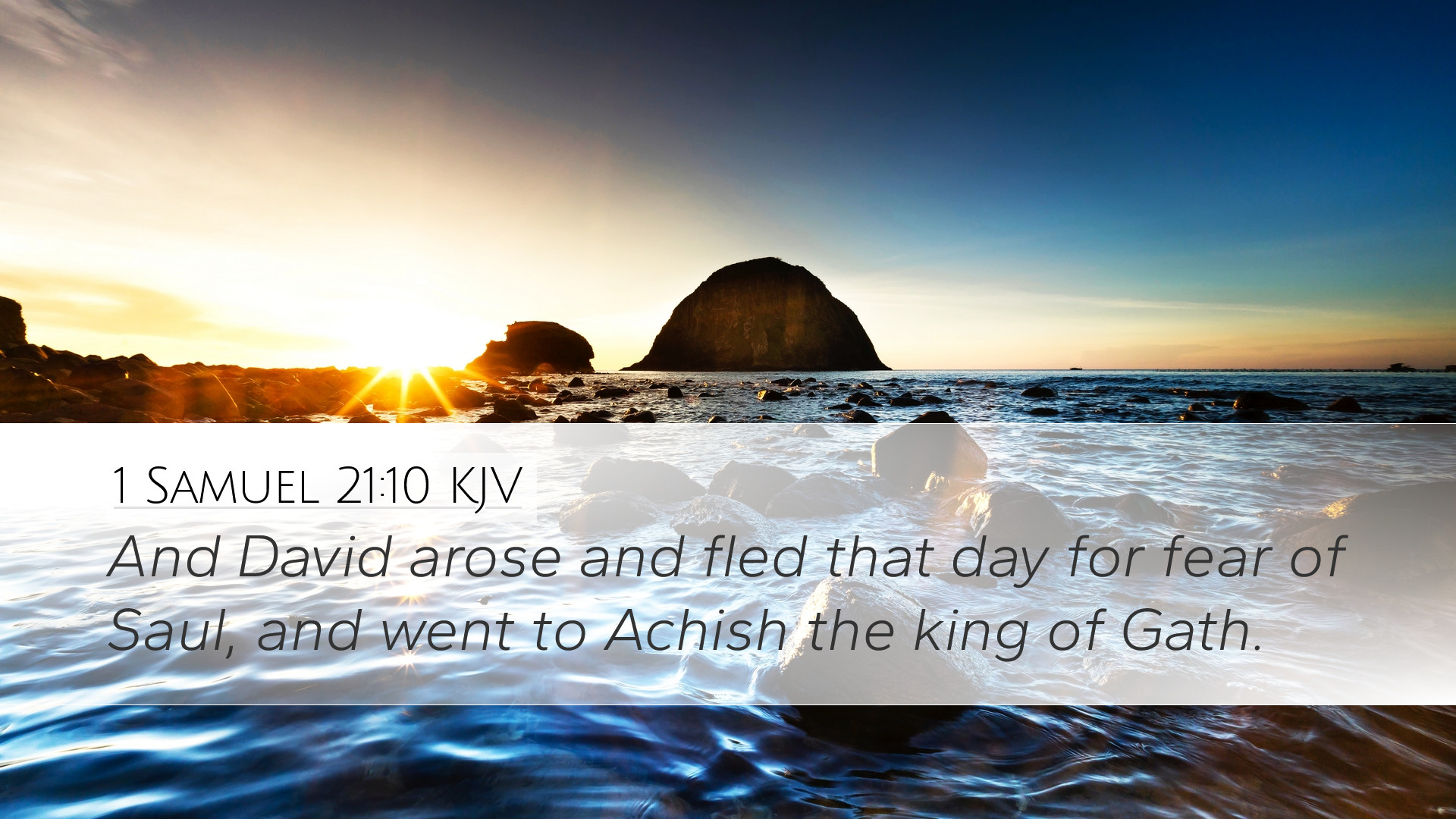Commentary on 1 Samuel 21:10
Verse: 1 Samuel 21:10 - "And David arose, and fled that day for fear of Saul, and went to Achish the king of Gath."
Introduction
This passage presents a pivotal moment in the life of David, illustrating the themes of fear, vulnerability, and divine providence. David, despite being anointed King of Israel, finds himself fleeing from Saul, the reigning king driven by jealousy and fear of losing his throne. This act of fleeing to Gath—a Philistine city—highlights David's complex situation and provides a rich ground for theological exploration and pastoral application.
Contextual Background
Historical Context: This episode occurs during a tumultuous period in Israel's history. Saul’s hatred for David had escalated to a point where David felt compelled to escape for his life. Gath, being a Philistine city, signifies the depth of David's desperation and sets the stage for a significant theological reflection on the choices we make when faced with fear.
Theological Context: This incident demonstrates the intersection of human fear and divine purpose. It raises questions about God's plans amidst human actions and decisions, illustrating that even when we find ourselves in difficult circumstances, God remains sovereign over our destinies.
Commentary Insights
- Fear as a Motivator: According to Matthew Henry, fear can provoke irrational actions. David's fear led him to seek refuge in the very place where he was most at risk, demonstrating how fear can distort our judgment.
- David’s Flight to Gath: Adam Clarke notes that seeking refuge among enemies indicates the precarious position David found himself in. It is a poignant reflection of the turmoil in David’s heart and highlights the extremes to which he would go to survive, regardless of the potential for betrayal.
- God’s Protection: Although David is fleeing, Albert Barnes emphasizes that God’s providential care is at work. David's adventure in Gath ultimately serves a purpose in his preparation for kingship, teaching him lessons in trust and reliance on God despite perilous circumstances.
- The Psychological State of David: David's actions may reflect a state of despair; as Matthew Henry points out, his flight is a demonstration of a man caught between his fear and the faith required to confront his enemies. This dichotomy is common among believers facing life's adversities.
- Foreshadowing His Future Kingship: David's experiences during this period, including his interactions with Achish, will later inform his capacities as a leader. Adam Clarke suggests that these moments of trial are critical, as they mold David into the great king he is destined to become.
- Reliance on the Flesh versus the Spirit: Albert Barnes draws attention to the danger of relying on earthly alliances for safety. David’s choice to flee to the Philistines underscores the tension of faith where often our first instinct is self-preservation, veering away from trusting God’s providence.
Theological Reflections
David's experience in Gath prompts serious reflection on two major themes: human frailty and divine sovereignty.
- Human Frailty: David was a man after God’s own heart, yet he experienced profound fear, leading to uncharacteristic decisions. This teaches that even the strongest believers may face moments of doubt and fear, reminding us of our vulnerability.
- Divine Sovereignty: The divine orchestration in David's life is intricate. It serves as a reminder that God uses even flawed human actions to fulfill His ultimate purposes. Despite David's missteps, God remains in control, guiding David toward his future as king.
- Lessons on Leadership: David's time in Gath would inform his future leadership. He learns the importance of discernment and the need for wisdom in navigating challenges—a critical trait for any leader.
Application for Today
For pastors and theologians, this passage serves as a deep well of insight into dealing with fear and making decisions under pressure. It invites reflection on how individual believers can experience similar feelings of despair yet be assured of God's presence and protection.
- Encouragement in Fear: Just as David turned to God amid chaos, believers today are encouraged to reach out for divine guidance rather than succumbing to paralyzing fear or making hasty decisions.
- Divine Purpose in Trials: David's journey reminds us that our trials can shape us for greater purposes. Pastors should encourage their congregations to view difficulties as potential stepping stones to spiritual maturity and deeper reliance on God.
- Community and Safety: David's flight underscores the importance of community. Believers should seek fellowship and support during challenging times, emphasizing that we are not meant to face our adversities alone.
Conclusion
1 Samuel 21:10 intricately encapsulates a moment of vulnerability in David's life, presenting rich themes for exploration and application. This verse invites believers to examine their own responses to fear and uncertainty, urging a deeper trust in divine sovereignty while recognizing the process of growth that comes from trials.


